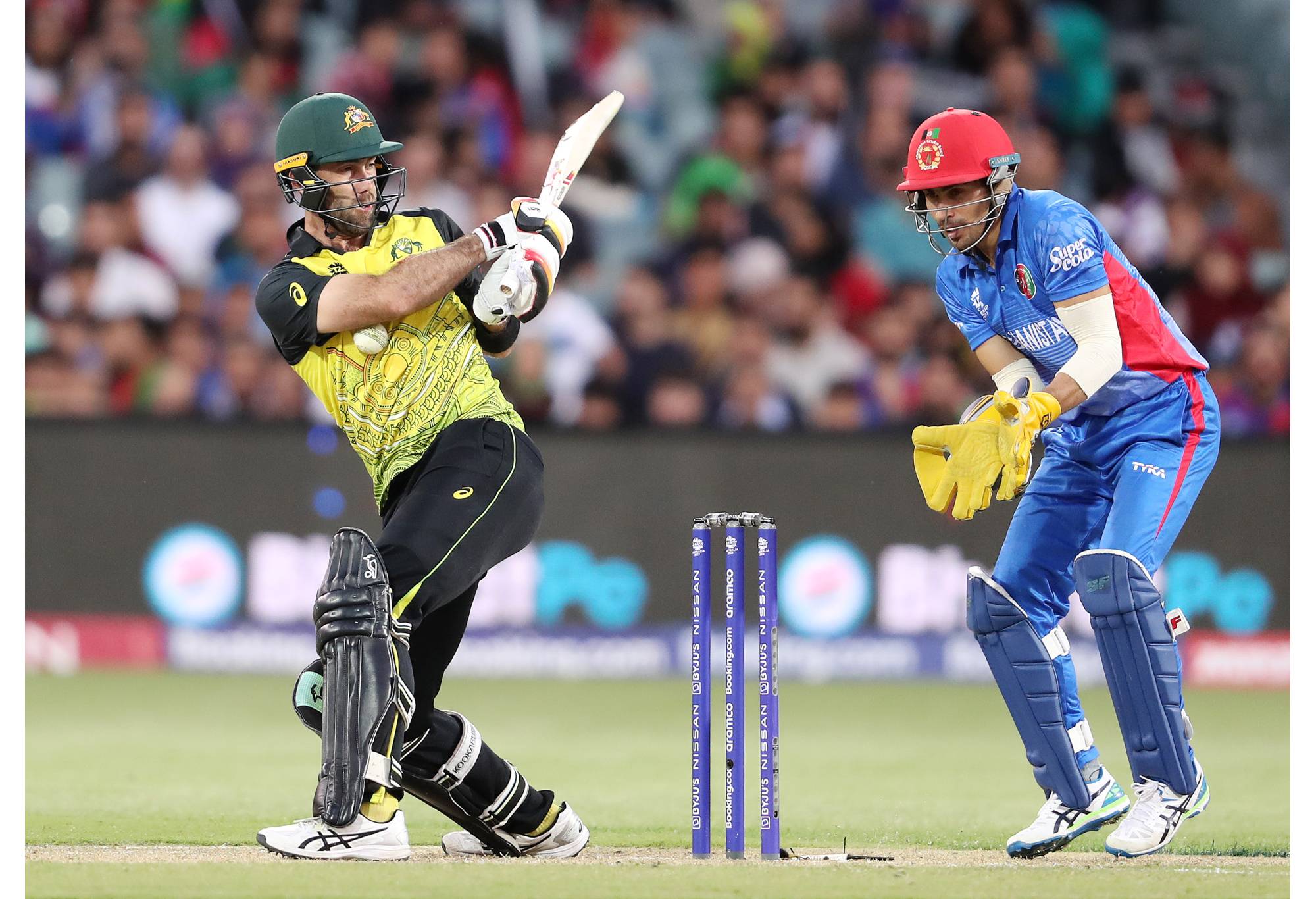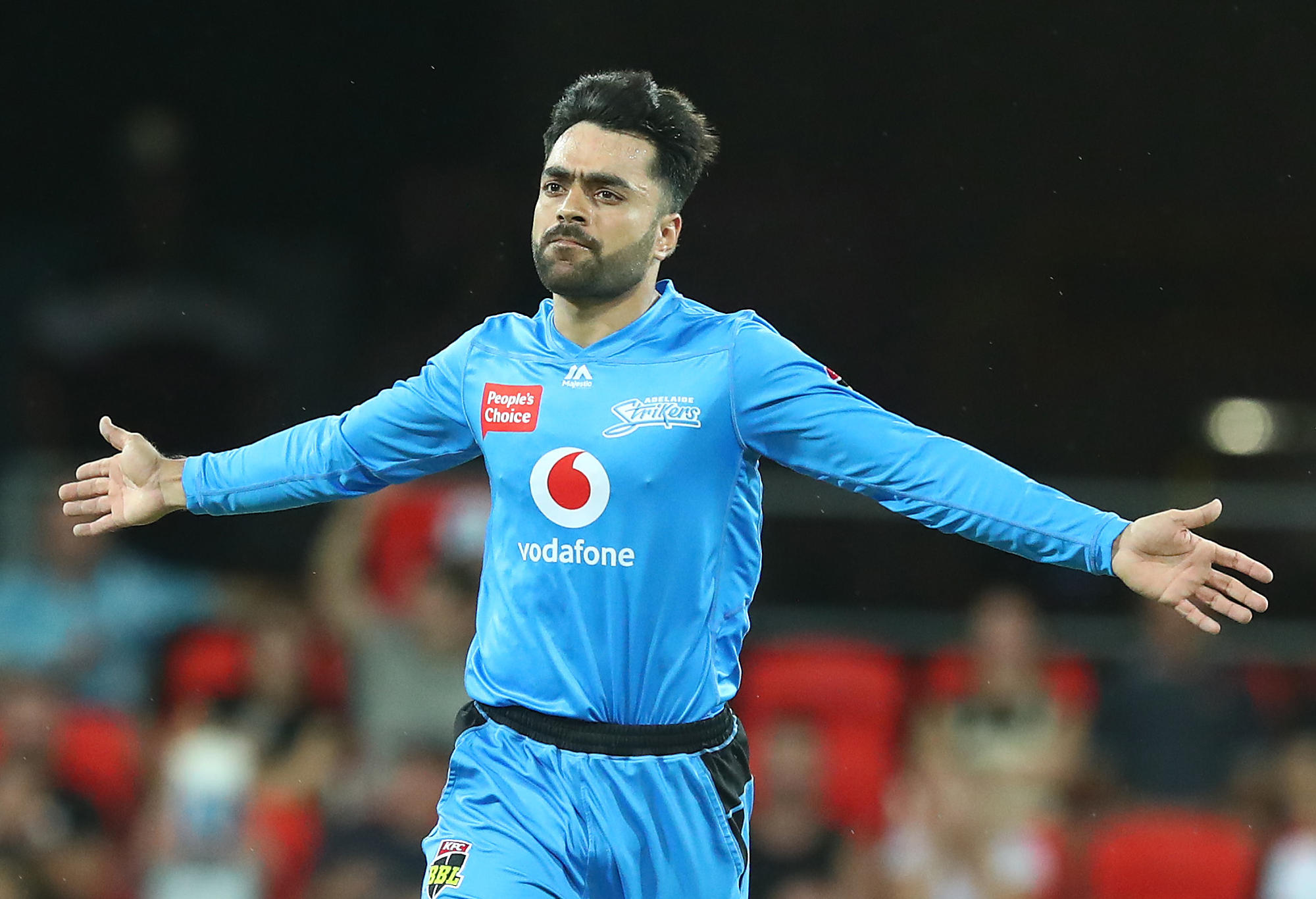Afghanistan’s place as a full member nation of the ICC is clearly untenable due to its Taliban government’s attitudes towards female participation in sport.
Cricket Australia has for the second time cancelled international fixtures with Afghanistan due to this reason, it’s about time the ICC stepped in.
The desire of cricket to keep expanding its base of participating nations should not take precedence over the human rights issues that are taking place in Afghanistan.
Nearly six years ago, Afghanistan and Ireland were elevated to full member status by the ICC, meaning they became part of an expanded group of 12 nations who could play Test cricket.

Glenn Maxwell plays a shot against Afghanistan in Adelaide at the T20 World Cup. (Photo by Sarah Reed/Getty Images)
Afghanistan’s rise from war-torn nation to a Test nation was hailed as one of the more remarkable meteoric rises in the history of international sport at the time.
While the Afghanistani and Irish associations get a much smaller slice of the ICC funding pie than the main revenue-earning country, India, or established nations like England and Australia, they get significantly more than the Associate nations on the next tier down in cricket’s global structure.
And they are included in the ICC’s Future Tours Programme along with all the traditional cricket-playing nations. Afghanistan is due to play 21 Tests, 45 ODIs and 57 ODIs in the 2023-27 schedule – their total of 123 matches is higher than South Africa (113), Ireland (110) and Zimbabwe (109).
Part of the many conditions that were part of Afghanistan and Ireland’s elevation to full member status was a commitment to women’s cricket, a huge growth area for the sport.
Full member nations must have “satisfactory women’s pathway structures in place” and “a sustained and sufficient pool of players to support strong and consistent national level selection across the senior men’s, U19 and women’s teams”.
When they were granted top billing in 2017, Afghanistan did not have a women’s team competing in ICC fixtures but was building towards achieving this goal after awarding central contracts to 25 players in 2020.
The Afghanistan Cricket Board stated at the time it wanted “to have a women cricket team albeit adhering to the traditional Afghan and Islamic values”.
But when the Taliban seized power in August the following year, several players fled the country, such as Roya Samim, who relocated to Canada, and Nilab Stanikzai and Shafiqa Khan, who found refuge in Australia.
In an interview with SBS soon after the takeover, the deputy head of the Taliban’s cultural commission, Ahmadullah Wasiq, reaffirmed women’s cricket would not be allowed under their regime.
“I don’t think women will be allowed to play cricket because it is not necessary that women should play cricket,” he said. “In cricket, they might face a situation where their face and body will not be covered. Islam does not allow women to be seen like this.”
Cricket Australia cancelled what was going to be an historic first Test against Afghanistan in November of 2021 and followed suit again last week when it called off any plans to stage a three-match one-day series at a neutral venue, as required in the Future Tours Programme. The Taliban has banned girls from high school since March as well as parks and gyms, while last month it decreed women would not be allowed to attend universities.
CLICK HERE for a seven-day free trial to watch cricket on KAYO
As is often the case with the ICC, it is trying to put a positive spin on the situation without doing much to resolve the issue.
The ICC established an Afghanistan Working Group in November, 2021, to report to the governing body’s board about the nation’s attempts to comply with its requirements surrounding women’s cricket.
Twelve months later, the working group reported it had held a “positive and respectful” meeting with an Afghanistan government representative who gave in principle support for women’s cricket.
“There are obviously challenges for it to resume but we will continue to work with the ACB to take this forward. The Working Group will closely monitor the commitment undertaken by the Afghanistan government and will continue to report back to the ICC board,” said the working group chair, Imran Khwaja, who is also the deputy chair of the ICC board.
Progress, if any is actually taking place, is painfully slow.
The ICC should suspend Afghanistan’s full member status until meaningful change occurs.
Zimbabwe had their status suspended for three months in 2019 by the ICC due to “political interference”. The ICC was concerned its funding was being used to fill government coffers rather than to support the game in the African nation.
If concerns such as these are enough to warrant a suspension, surely Afghanistan’s current state of affairs also deserves such sanctions.
Cricket needs to keep expanding its global footprint but full member status can’t be granted when it’s not deserving.
Many of the associate nations who want to follow in the footsteps of Afghanistan and Ireland would no longer see Test cricket as the ultimate goal anyway. They are better able to compete with the big dogs in T20 cricket, as we saw earlier this summer when teams like Namibia, Scotland and the Netherlands were able to upset full member nations.
The Women’s Under-19 T20 World Cup which is underway in South Africa highlights the changing face of global cricket.
Bangladesh beat Australia in the first match of a 16-team tournament which features countries such as Indonesia, the United States, Rwanda and the UAE.

Nick Hockley. (Photo by Mark Evans/Getty Images)
This latest drama involving Cricket Australia’s cancellation of the Afghanistan series has predictably led to the old “sport and politics shouldn’t mix” debate rearing its ugly head.
The Afghanistan Cricket Board labelled the decision “pathetic” and threatened to complain to the ICC over Australia “prioritising political interests over the principles of fair play and sportsmanship”.
CA chief executive Nick Hockley was spot on when he responded by saying “basic human rights is not politics”.
That’s not to say CA has always done the right thing when it comes to helping the smaller nations. Australia have rarely played sides like Bangladesh, Zimbabwe and Ireland while scheduling regular clashes home and abroad with money spinners India and England.
There is a perception that Australia will use “security concerns” to call off an inconvenient tour against some nations who are not high on the list of priorities.

(Photo by Chris Hyde/Getty Images)
Leg-spinner Rashid Khan’s threats to not return to the BBL will have little to no impact on CA’s decision-making.
He’s a popular player and has been warmly embraced by the Adelaide Strikers and their fans since his arrival in 2017 but in the grand scheme of things, if he does not come back next summer, CA is not all of a sudden going to change its policy.
If other nations follow CA’s lead or the ICC bans Afghanistan from international competition, Rashid and his national teammates may have no option but to travel the global T20 circuit, similar to how the likes of Barry Richards and Clive Rice switched to English county cricket when South Africa was expelled due to apartheid.
There is no easy or quick fix to this issue but the ICC needs to act rather than hide behind working groups and press releases for the best interests of cricket, which after all is what it’s supposed to do.































































































